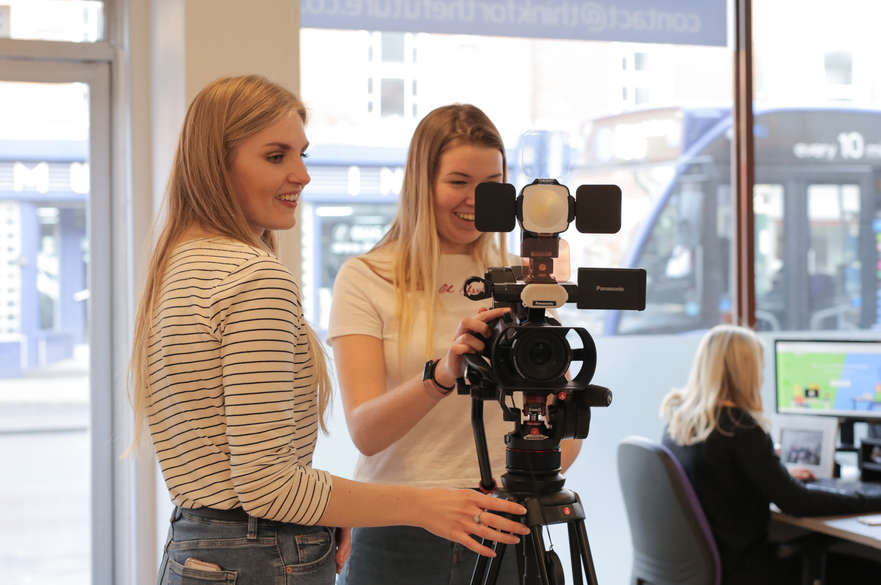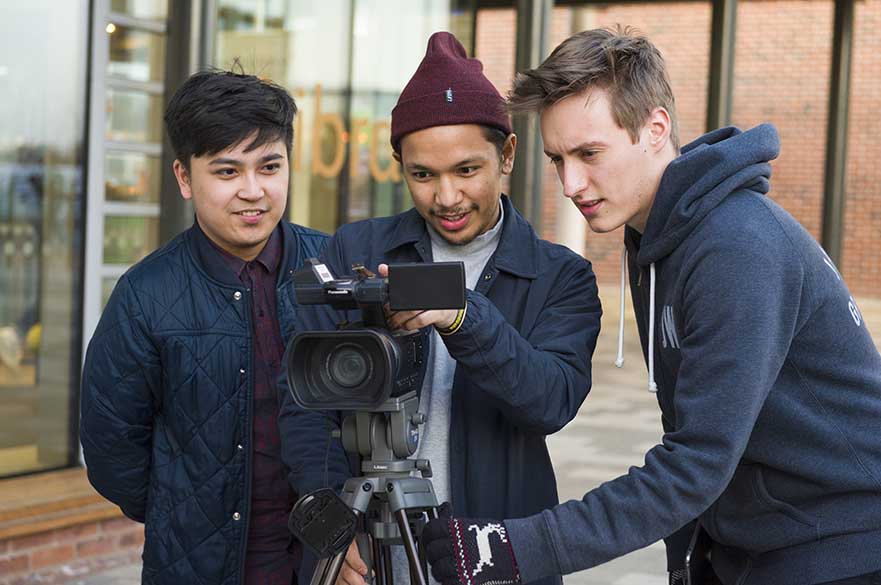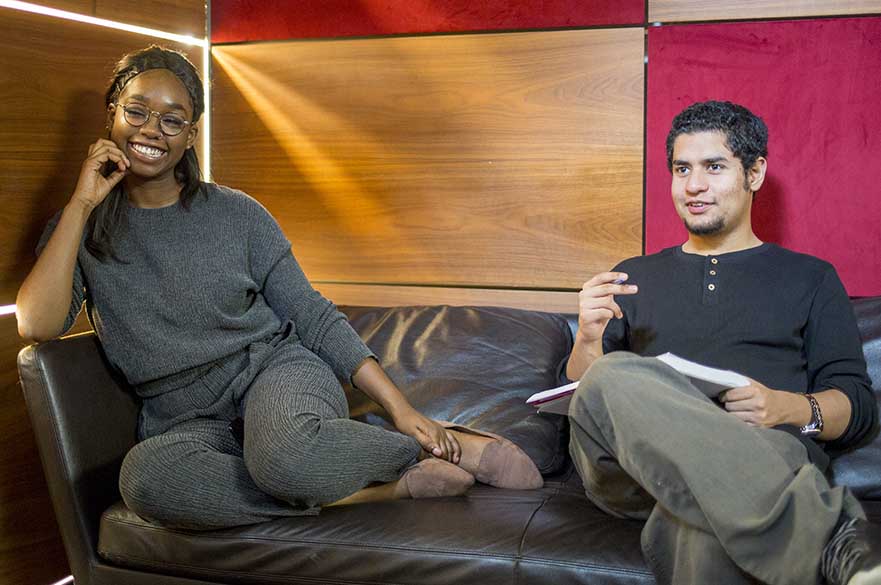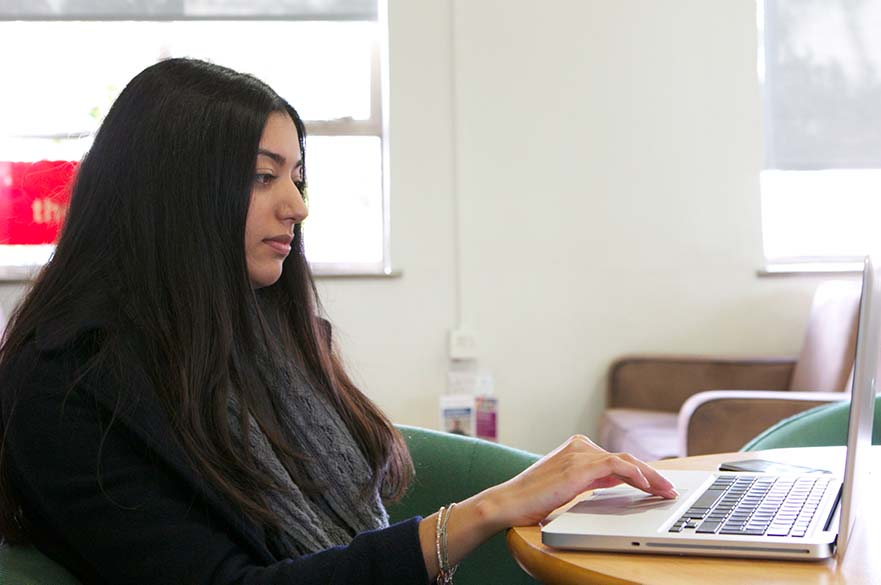This course is in Clearing
Offers from 80 tariff points
About this course
Prepare for a dynamic media career with this practical and skills-orientated degree.
The BA (Hons) Media Communications course is designed to prepare you for a fast-paced and ever-evolving media landscape. You'll develop essential skills as a professional communicator, supported by expert academics and real-world experiences.
This course combines theory with hands-on practice, allowing you to explore digital technologies, media applications, and their impact on society. You'll work with media professionals, undertake placements, and engage in projects tailored to your interests and career goals.
By the end, you'll be equipped to excel in various media roles, from content creation to social media management, and be ready for a successful career in the global media industry.
We are proud to be part of the BAFTA Albert education partnership.

What you’ll study
Optional modules will vary from year to year and this list is indicative only
Core modules
Content Creation
This module teaches essential skills for producing high-quality audio, video, and digital content. You'll gain hands-on experience with industry-standard tools, create social media content, and explore VR and AR technologies. Contextual lectures cover media production concepts and ethics. By the end, you'll have a solid foundation in content creation, ready for future media communications careers.
Analysing Media Texts
An introduction to classic and contemporary techniques and methods of critical textual analysis of media forms including class, sexuality, gender, age, identity/ies and their intersections. The module will draw on examples of texts from across the popular cultural field (film, television, video games, music, social media etc.), and you will also explore how audiences, users and prosumers consume those texts.
Understanding Creative Industries
Learn the essential theoretical and conceptual vocabulary needed to make sense of current trends in the media industries landscape, both nationally and internationally. You will explore questions relating to media ownership, organisation, power and control. Guest speakers will bring a new dimension to your learning by introducing real industry contexts, and by identifying the skills and competencies employers are looking for.
Launch: Advertising, PR and the New Creativity
Explore how modern creativity is transforming today's economy. You'll study advertising, PR, and media technology's intersection with psychology and sociology. Learn core writing and image skills, set up your own agency, and develop your team's unique voice. Practical training and critical analysis prepare you for the creative economy's diverse demands.
Psychology of Communication
This module is designed to demonstrate the centrality of communications, not just to the functioning of society, but also for the very constitution of who we are as individuals. Based within, but by no means contained by, the field of Social Psychology, it looks at how people communicate with one another both verbally and non-verbally. It also considers the role of both conscious and sub-conscious processes. Other key topic areas include the arts of conversation and persuasion, the psychology of leadership, group dynamics and intergroup relations.
Professional Communications 1: Skills and Concepts
Kickstart your journey in professional communications with this module. You'll master essential skills for strategic and corporate communications, from writing press releases and advertising copy to mastering storytelling. Develop presentation and interpersonal skills, work on real-life scenarios, and gain hands-on experience.
Core modules
Media, Theory and Society
This module explores how media and cultural theories are used to understand and make sense of our mediated society. The aim is to give you a thorough understanding of how creative thinking underpins and informs the practice work you’ll undertake.
Pitch: Media Communications in Action
Build on your skills from Year One by developing an international marketing project. Collaborate with global peers through Collaborative Online International Learning (COIL), refining your expertise in market research, brand management, and digital marketing. Gain cross-cultural communication and teamwork skills. Create comprehensive, culturally sensitive marketing strategies, preparing you for success in the diverse, interconnected marketing world.
Professional Communications 2: Working in the Creative Industries
In this second Professional Communications module, you'll apply your skills in a real-world setting, focusing on the fast-growing creative industries like media, film, TV, and games. With input from professionals and NTU's Employability team, you'll enhance your resilience and innovation. You'll also complete a work placement and develop a career plan, preparing for your future in this dynamic sector.
Pathway 1: An international exchange
Travel the world, meet new friends, and have experiences you will remember for the rest of your life.
Our flexible curriculum has been designed to allow some amazing opportunities for you. Your second year of study is divided into two semesters, giving you the opportunity to take part in an international exchange. You could study with one of international exchange partners in Australia, Europe, USA, Canada, Thailand and many, many more.
Our dedicated team will support you in finding and arranging a suitable exchange. And don't worry about the cost, they will help you apply for any grants or loans you may need, as no one should miss out on the chance to broaden their horizons.
Pathway 2: Taught pathway choosing optional modules
Core modules:
Talking Media: Arguing, Debating, Speaking, Performing
This module looks at argument, speech and debate within media forms (e.g. TED talks, panel shows, radio phone-ins, blogs and vlogs). Using examples from different forms, it examines both the format of media debates (e.g. issues of ‘balance’ and notions of a ‘centre’; questions of expertise; managing hostile, angry and heckling voices) and successful techniques for making an argument and ‘pitching’ ideas.
Optional modules (choose two)
Optional modules will vary from year to year and this list is indicative only
Short Film Production and Exhibition
Enhance your production skills through the creation of a short film. You will use a range of equipment and practical craft techniques to your idea from creation, through professional planning, filming, and editing to promotion and festival entry. You will be supported in a variety of roles in your team with professional advice from practice-based academic tutors and our technical team.
Branding for Media Production
This module focuses on the development and production of brand assets and treatment in contemporary media production. It gives you the opportunity to produce a portfolio of varied visual and interactive material in support of a brand. Building on your existing technical skills, you will be encouraged to use new and advanced software features in production of branding assets and will be introduced to new areas of exploration to enhance your portfolio and CV.
Photojournalism
This module enables you to demonstrate skills, knowledge and understanding of the theory and practice of stills photography. You'll gain practical skills in image capture on still digital formats and the transmission of stills You'll be competent in producing stills for publication and demonstrate the ability to write clear and accurate captions and news stories. You'll understand photographic practice and media law and ethics relating to the publication of images from both professional photographers, citizen journalists and other external sources in newspapers, magazines and on related websites and social media.
Researching Media and Communication
This module introduces the key methods and analytical approaches of media and cultural studies. It enables you to design and produce original research projects, and to gain deeper understanding of the research methods you might use in your final year dissertation. It outlines a range of methods (including textual analysis, ethnography, and critical discourse analysis), and shows how these can be implemented to particular case studies from the media and other cultural practices.
Analysing Popular Music
Analysing Popular Music has two major concerns: firstly, to develop a social understanding of transatlantic popular music, and secondly, to develop a cultural-historical perspective on its development over the past hundred years and more. This module introduces you to theoretical approaches to the study of popular music, allowing you to engage in independent critical analysis of popular music and popular musical cultures.
The Communicating Self: Psychology of Communications
This optional module explores psychological and sociological theories of identity. Starting with basic concepts of personality, it moves into more radical theories, revealing how identities can be fluid and multifaceted.
Media, Communication and Culture in East Asia
This module explores contemporary media and cultural change in East Asia, focusing on China, Korea, and Japan. It covers print media, TV dramas, films, manga, anime, video games, and new media like mobile phones and the internet, examining their cultural impact in the region.
You may choose to take an optional year-long placement in Year Three, either in the UK or overseas.
You will be supported by our experienced Employability Team to source a suitable placement.
Core module
Media Communications Major Project
Your Major Project let you create a major piece of work on a topic you’re passionate about in media, communications, or culture. Whether it's a 10,000-word research paper or a creative project, this capstone helps build your research and communication skills and prepares you for your future career or studies.
Professional Communications 3: Corporations, Organisations, Influencers
This final module in Professional Communications prepares you for diverse careers in media and creative industries. You'll develop entrepreneurial skills, work on real projects with external organizations, and explore roles like freelancing or social media influencing. By the end, you'll be ready to succeed in your chosen career path.
Optional Modules
Optional modules will vary from year to year and this list is indicative only
The Body and Popular Culture
How is the body represented in popular culture? Examine key ideas such as how we might understand the various meanings surrounding the body across a range of media and cultural forms. By studying a selection of case studies, you'll explore the way that the body is addressed and located within popular culture, for example, from music to sport.
Global Journalism
Go beyond borders, exploring journalism's worldwide impact, drawing from diverse perspectives. You'll tackle theories from politics, economics, sociology, and more, evaluating how global forces shape journalism. Get ready to research and write a compelling essay on the theory and practice of global journalism.
Client-Led Media Production
During this module, you'll be able to focus on the development of skills in media production by completing a media project that will be set to a 'real brief'. This is an opportunity for you to enhance your employability options by participating in live projects with a real purpose. This module will encourage you to make connections between theory and practice.
Podcasting
Learn the practical skills needed to compile and produce successful podcasts, while developing an understanding of the role of podcasting in the contemporary media landscape. Guest speakers who are experts in the field will explain the logistics and monetisation of podcasting to provide a better understanding of the economic framework within which podcasting sits.
DJ Cultures: History, Theory and Technique
This module introduces you to DJing, from its roots to its impact on popular culture. You’ll learn basic DJ techniques and try different DJ styles, their histories, and cultural significance. No experience is needed, and you'll also explore the politics, gender, and race issues surrounding DJ culture while gaining transferable skills.
Lifestyle and Consumer Culture
Explore key approaches to understanding lifestyle and the culture of consumption. You'll be introduced to many important theoretical approaches to understand lifestyle and consumer culture and you'll use many case studies such as travel and tourism to evaluate these.
Natural Futures? Global Environmental Catastrophes and the Fate of Life on Earth
Explore the environmental crisis by studying its history, understanding its current impact, and imagining better futures for Earth. You'll learn about different theories, politics, and activism related to the environment and be inspired to become an agent of change for a sustainable world.
Persuasion, Promotion, Propaganda
This module explores how politics shapes our world, focusing on how political leaders and individuals communicate during war and peace. While primarily examining British and American politics, it also looks at political systems in other countries, helping you understand global political dynamics.
New Media and Digital Cultures
This module explores the latest trends and challenges in media communications, focusing on emerging technologies like AI, VR, and blockchain. You'll work on practical projects, such as AI-enhanced content creation and multimedia production, while learning about ethics, data analytics, and the future of digital media.
We regularly review and update our course content based on student and employer feedback, ensuring that all of our courses remain current and relevant. This may result in changes to module content or module availability in future years.
How you're taught
Enabling creative thinking is central to how you’ll be taught. Classes consist of lectures, seminars, workshops, screenings and tutorials designed to develop your skills in creative thinking, problem-solving, critical analysis, research methods, time management, presentation and group work.
Work experience
You’ll undertake a period of work experience and complete a placement report. Employability exercises during seminars will help you produce career-based material such as your CV, LinkedIn profile and to start to develop potential career areas.
More student opportunities
International exchange
You’ll also have the option to take part in an international exchange at a partner university. Or you could source work placements abroad. These options will enable you to gain impressive international experience, and broaden your perspective and career ambitions.
You’ll experience other cultures, travel the globe and open your eyes to a world of opportunities. Our exchange partnership with a number of international universities enables you to live and study in another country in your second year.
Learn a new language
Alongside your study you also have the opportunity to learn a new language. The University Language Programme (ULP) is available to all students and gives you the option of learning a totally new language or improving the skills you already have.
Learning a new language can enhance your communication skills, enrich your experience when travelling abroad and boost your career prospects. Find out more about the University Language Programme.
Creative industries in Nottingham
Nottingham has a thriving creative arts scene which feeds the local creative industries. Many successful TV production, digital design agencies have chosen to base themselves in Nottingham.
The creative industries in Nottingham include organisations like Nottingham Contemporary, Broadway Cinema and Media Centre, Antenna Media Centre and LeftLion.
How you're assessed
We use a varied and diverse range of coursework assessments to develop your skills and support your progress. These include digital projects, reviews, case-studies, essays, presentations and reports.
Our innovative approach to assessment means that in Year One you will develop and enhance a complementary set of key skills for success in second and third year, and throughout the degree the varied assessment pattern will enable you to engage with the past and prepare for your future through an exciting array of projects
Contact hours
If you’re struggling with a topic or require additional support or guidance, you can arrange to see your tutors in small groups or one-to-one, to discuss essay plans or to seek some specific academic guidance.
It is the nature of the subjects offered in the School of Social Sciences, however, that much of your time will be spent engaged in independent study. We recognise that this marks a change of culture from school or college, and we have in place a system of study support to help you adapt to this.
Careers and employability
Your career development
You’ll possess many of the attributes needed to develop a career in the field of communications and media. These include research; organisation; content production; team-working and time-management skills. Graduates have gone on to work in journalism, events management, marketing, advertising and public relations. This includes roles as a social media consultant; account manager; PR and marketing manager and digital content assistant.
Campus and facilities
Media laboratories and equipment
We have specialist media laboratories where you will develop multimedia production skills. Equipment includes:
- HDV camcorders
- tripods
- lighting kit
- cameras
- voice recorders
- iMacs
- finalCut software
- turntables
- sound equipment.
This equipment is supported by technical staff and is available as free hire for student project work.
Your campus
NTU’s City Campus has everything you’ll need to stay busy between lectures. As well as the Boots Library and its beautiful roof garden, there’s our stylish Students’ Union building and two-storey, 100-station gym; a whole host of cafés, bars, restaurants and food outlets for every taste; our much-loved Global Lounge; performance and rehearsal spaces for musicians; and much, much more!
Take a few steps off campus and you’ll find yourself in the heart of Nottingham — England’s original ‘rebel city’. It’s one of the UK’s top 10 student destinations, and one of Europe’s top 25. Enjoy a booming indie arts scene, pop-up galleries, the nationally renowned Nottingham Contemporary, two A-list theatres, the iconic Broadway (voted one of the world’s top 100 independent cinemas by Total Film), and a constant rotation of events and exhibitions.
Take our virtual tour to get a real feel for the campus.
Here are some of the free services, student discount and benefits you'll get studying at NTU
We've carefully considered what benefits and services you need for your studies, so when you join NTU you'll get free printing and materials credits, access to our free WiFi, a copy of Microsoft Office, and even borrow a laptop if yours is out of commission.
For life outside your lectures, you'll enjoy access to over 60 sports clubs and 130 student societies, discounted travel and bike hire, free language learning, award-winning student support and an entertainment programme which is second to none.
See all the benefits and free services you will enjoy as an NTU student.
Societies
Current students run societies in a range of Humanities and Arts subjects including History, Medieval, Film, Filmmaking, Philosophy, Politics and International Relations, and the Book society.
There are also a number of media channels which our students get involved in such as the NTU radio station FlyLive, our student magazine Platform, and TV station TrentTV.
Find out more about student societies at the Student Union website.
Entry requirements
This course is in Clearing
Looking for a place in Clearing? We are accepting application and would love to hear from you!
UK students
This course is in Clearing
Looking for a place in Clearing? We are accepting applications and would love to hear from you!
Clearing requirements
From 80 UCAS tariff points from up to 4 qualifications.
To discuss our entry requirements and see what we can offer you, call us now on +44 (0)115 848 6000. Alternatively, if you already have your qualifications, apply online via our Clearing Application form.
Preparing for results day? Beat the queue and sign up for NTU Priority for up-to-date information about all things Clearing. You’ll get an offer ahead of Clearing, subject to you achieving the required grades on results day.
To find out what qualifications have tariff points, please use our tariff calculator.
Additional requirements for UK students
There are no additional requirements for this course.
Contextual offers
If you don’t quite meet our entry requirements, we might be able to make you a lower offer based on a range of factors, including your background (such as where you live and the school or college you attended), your experiences and your individual circumstances (you may have been in care, for example). This is called a contextual offer, and we get data from UCAS to help make these decisions. We do this because we believe everyone with the potential to succeed at NTU should have the opportunity to do so, no matter what barriers you may face.
Meeting our entry requirements
Hundreds of qualifications in the UK have UCAS Tariff points attached to specific grades, including A-levels, BTECs, T Levels and many more. You can use your grades and points from up to four different qualifications to meet our criteria. Enter your predicted or achieved grades into our Tariff calculator to find out how many points your qualifications are worth.
Other qualifications and experience
NTU welcomes applications from students with non-standard qualifications and learning backgrounds, either for year one entry or for advanced standing beyond the start of a course into year 2 or beyond.
We consider study and/or credit achieved from a similar course at another institution (otherwise known as credit transfer), vocational and professional qualifications, and broader work or life experience.
Our Recognition of Prior Learning and Credit Transfer Policy outlines the process and options available for this route. If you wish to apply via Recognition of Prior Learning, please contact the central Admissions and Enquiries Team who will be able to support you through the process.
Getting in touch
If you need more help or information, get in touch through our enquiry form.
International students
This course is in Clearing
Looking for a place in Clearing? We are accepting applications and would love to hear from you!
Clearing requirements
From 80 UCAS tariff points from up to 4 qualifications.
To discuss our entry requirements and see what we can offer you, call us now on +44 (0)115 848 6000. Alternatively, if you already have your qualifications, apply online via our Clearing Application form.
Preparing for results day? Beat the queue and sign up for NTU Priority for up-to-date information about all things Clearing. You’ll get an offer ahead of Clearing, subject to you achieving the required grades on results day.
Additional requirements
English language requirements: See our English language requirements page for requirements for your subject and information on alternative tests and Pre-sessional English.
Additional requirements for international students
If you need help achieving the academic entry requirements, we offer a Foundation preparation course for this degree. The course is offered through our partner Nottingham Trent International College (NTIC) based on our City Campus.
English language requirements
View our English language requirements for all courses, including alternative English language tests and country qualifications accepted by the University.
If you need help achieving the language requirements, we offer a Pre-Sessional English for Academic Purposes course on our City campus which is an intensive preparation course for academic study at NTU.
Other qualifications and experience
If you have the right level of qualifications, you may be able to start your Bachelors degree at NTU in year 2 or year 3. This is called ‘advanced standing’ entry and is decided on a case-by case basis after our assessment of your qualifications and experience.
You can view our Recognition of Prior Learning and Credit Transfer Policy which outlines the process and options available, such as recognising experiential learning and credit transfer.
Sign up for emails
Sign up to receive regular emails from the International Office. You'll hear about our news, scholarships and any upcoming events in your country with our expert regional teams.
Getting in touch
If you need advice about studying at NTU as an international student or how to apply, our international webpages are a great place to start. If you have any questions about your study options, your international qualifications, experience, grades or other results, please get in touch through our enquiry form. Our international teams are highly experienced in answering queries from students all over the world.
Policies
We strive to make our admissions procedures as fair and clear as possible. To find out more about how we make offers, visit our admissions policies page.










